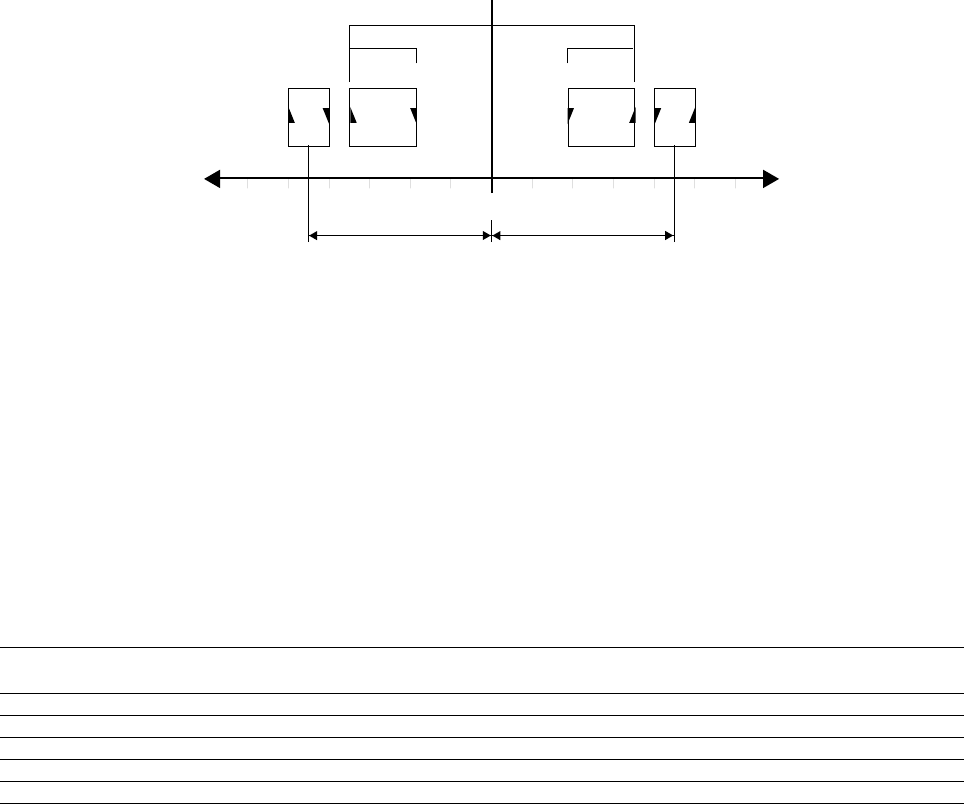
RC GROUP - 149_ItEn.0102
52
MP2000 AIR CONDITIONERS
Sistema di controllo a microprocessore per condizionatori d'aria •
Air conditioners microprocessor control system
ore Unità1 Unità2 Unità3 Unità4
hours Unit1 Unit2 Unit3 Unit4
0÷12 Master ON Slave ON Slave ON Stand-by
13÷24 Stand-by Master ON Slave ON Slave ON
25÷36 Slave ON Stand-by Master ON Slave ON
37÷48 Slave ON Slave ON Stand-by Master ON
49÷60 Master ON Slave ON Slave ON Stand-by
all’80% del preallarme di alta temperatura oppure all'80%
dell’allarme di bassa temperatura, rispetto al set-point di
temperatura dell'unità e si disattiva con un differenziale
del 40% come nell’esempio seguente:
Fig. 36
Quando si ripristina la condizione di attivazione, l'unità
viene rimessa in stand-by con un ritardo di 30 secondi non
modificabili.
L'unità "Master" è sempre quella dopo l’unità in stand-by.
Nel caso compaia uno degli allarmi AL01, AL02, AL21, AL22,
AL36 sull'unità "Master" o venga disattivata tramite il tasto on/
off o dall'abilitazione esterna, essa viene posta automatica-
mente come "Slave" e la successiva come "Master".
Esempio di rotazione:
Supponiamo 4 unità collegate in rete LAN con abilitata la
funzione "Change Over" con tempo di rotazione di 12 ore.
La logica di rotazione per le prime 60 ore sarà la seguente:
RETE LAN CON FUNZIONE CHRONO
La rete LAN non trasmette i dati di impostazione della
funzione Chrono alle altre unità connesse in rete, è quindi
necessario provvedere all'impostazione di tutti i parametri
quali data, ora corrente e fasce orarie, su tutte le unità
connesse alla rete come indicato nel capitolo "Funzione
Chrono" precedentemente descritto.
RETE LAN CON FUNZIONE COMBINATA CHRONO /
CHANGE OVER
E' possibile che le unità presenti nella rete LAN abbiano le
funzioni "Chrono" e "Change Over" abilitate.
In questo caso è la funzione Chrono che prevale sulla
funzione "Change Over".
Infatti solo se l'unità è abilitata al funzionamento dalla
funzione "Chrono" vengono conteggiate le effettive ore di
funzionamento dal "Change Over" e di conseguenza la
rotazione delle unità.
22°C
xL.Alarm
4,5°C
1°C1°C
xH.Prealarm
4,5°C
20,2°C
80% 80%
40% 40%
18,4°C
25,6°C
23,8°C
SET POINT
of the high temperature prealarm or 80% of the low
temperature alarm, according to the set point. The unit
switches off with a differential of 40% as shown below:
When the activation condition is reset, the unit is put in
stand by with 30 seconds delay (fixed time).
The “Master” unit always follows the one in stand by.
In case any of the following alarms occur on “Master” unit:
AL01, AL02, AL21, AL22, AL36, or it is deactivate by on/off
switch or external enabling, it becomes automatically as
“Slave” unit, while the following one as “Master”.
Rotation example:
Supposing 4 units in LAN connection with "Change over"
function and a rotation time of 12 hours.
The rotation logic for the first 60 hours will be the following:
LAN NETWORK WITH CHRONO FUNCTION
The LAN network doesn't communicate the CHRONO
function parameters to the other units connected to the
LAN. It is necessary to manually set all the parameters,
such as: date, current time and timezone, on all the units
connected to the LAN, as indicated in "Chrono function"
previously described.
LAN NETWORK WITH COMBINED CHRONO /CHANGE
OVER FUNCTIONS
It is possible that all units connected to the LAN network
have activated at the same time the "Chrono" and the
"Change over" functions.
In this case the "Chrono" function is dominant on the
"Change over" function. In fact, the real working hours of
the "Change over" and consequently units rotation, are
enabled only if the unit is enabled for running by the
"Chrono" function.


















